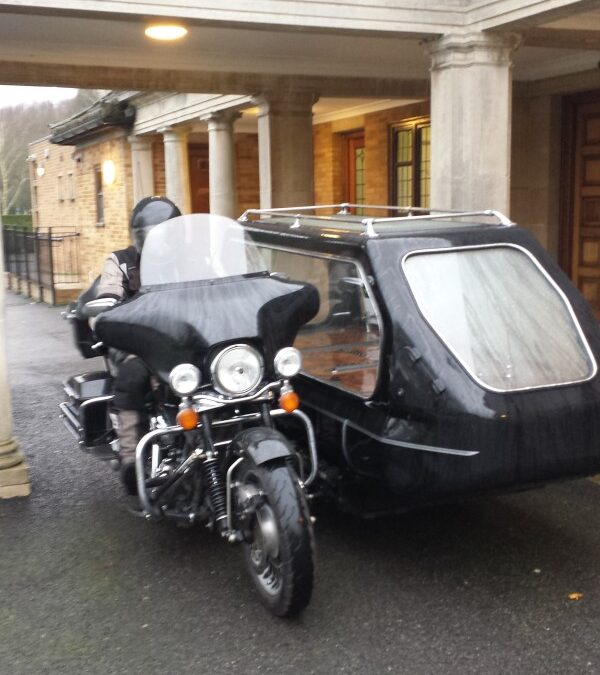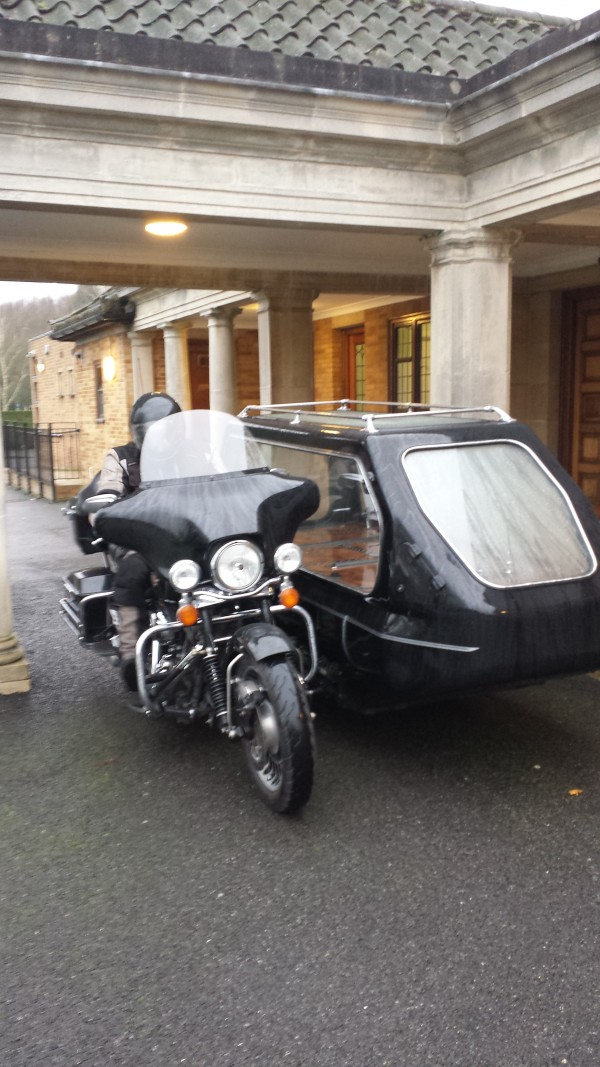by Michael | Apr 20, 2020 | Blog
You don’t need me to tell you that there are a lot of deaths at the present time, and I’m truly sorry if you are affected. If you are, you are probably aware that your funeral choices are now limited.
Direct Cremation
Depending on where you go, you may be offered a direct cremation. That means the body is cremated with no celebrant or even mourner present. The next-of-kin is simply offered the ashes afterwards. That permits minimal closure and is not satisfactory for most people.
‘Conventional’ Services
The fact that one crematorium only offers direct cremation doesn’t prevent you from having a more conventional service, if you are prepared to travel to another, as there’s no consistency across crematoria! Of course, the service attendees are limited to 10, so it may mean picking and choosing your guests. Also, respecting social distancing, you may be sitting apart from each other, so this is also far from an ideal scenario.
One solution
A number of people are considering a Memorial Service (or Celebration of Life) once lockdown is over. This has many advantages: you can hold it where you wish (it doesn’t have to be at the crematorium or chapel), you can invite whom you choose, you can serve up a spread on the premises and, most importantly, you can have the ceremony that you feel is most appropriate. It can be compered by anybody (including a celebrant, if you so desire) and a celebrant can give you ideas what can go into the ceremony and who could take part.
Another solution
It may suit you to go to the crematorium garden (by arrangement) or elsewhere for a scattering of ashes ceremony, which a celebrant can lead for you.

by Michael | Sep 27, 2016 | Blog
Recently, I wrote about crucial decisions that affected wedding planning. I’d now like to look at life-or-death decisions.
By that I mean decisions relating to death.
It’s an understatement, but when someone dies, it can be an extremely difficult time for those left behind. Obviously, just as relationships differ, so will reactions. Many people will be experiencing emotions such as shock, anger, grief or confusion. It is at just such a time, when they’re at their lowest ebb, that they are expected to deal with the funeral (and, potentially, probate or a contested will, etc).
First Steps
In most cases, help is available. The GP or hospital doctor who signs the death certificate will normally direct you to your next port of call. This is often the Town Hall, where there is more paperwork waiting for you before the death can be registered.
Some Councils (have a look on Google) offer a package that covers everything in one place, and that can make things much easier.
Funeral Directors can normally give advice and guidance.
Funeral
Registering the death is a legal obligation. A lot of people may be surprised to learn that a funeral is not.
Most people will choose to have a funeral. This may be through choice,or because it’s ‘the done thing’. It may well be in order to achieve closure via a ceremony. You can actually – subject to certain legal regulations – bury your loved one in your garden, if you so choose. The point is that you don’t need to have anything done beyond disposing lawfully of the body. This may certainly save on Funeral Director fees, which can be really quite high.
Questions
Nonetheless, most will go with a funeral. Of course, you have to decide on a burial (standard or woodland?) or a cremation. The deceased may have left instructions. You may have strong feelings.
How big and grand do you want the funeral to be? What about the wake?

Fully, partly or not religious?
Another fallacy is that the funeral has to be fully religious. Or else, humanist.
What if the deceased totally rejected religion? What if the surviving family does? What if the deceased was agnostic? What if the family is of mixed religious faiths? In such cases, there is real scope for a civil celebrant.
A civil celebrant will visit the family and discuss the possibilities. They will be able to advise and offer suggestions. They will usually aim to make the service a celebration of life (although it will probably include serious and affecting readings and moments). The service will be tailored to your exact requirements and wishes.
Lots of issues to consider, but, as I’ve suggested, help is at hand.
I acknowledge that this article only scratches the surface of the life-or-death decisions, but I hope it raises questions that you may be glad you have faced.

by Michael | Aug 9, 2016 | Blog
We all know the saying, “The only certainty is death.”
Visiting Bereaved Families
As a funeral celebrant, I am only too well aware of its truth. I visit bereaved families as a matter of course, although no two visits are the same.
I don’t go as a counsellor or psychotherapist. I’m not trained for that. I do sometimes give an opinion, when it’s called for, but always explain that it’s a personal opinion only.
At my visits, I see families in various stages of grief. Some are angry, some so sad; others feel responsible in some way for the death. A lot of family members don’t understand what has happened; many feel numb and confused. I remember being baffled by one family (a father, three sons and a daughter) who spent the whole of my visit cracking jokes (often very funny ones!), and making it very hard for me to get anything done. However, when I saw them weeping at the funeral, I understood that that had been their way of coping.
Preparing the ceremony
The purpose of my visit specifically is to help the family draw up a bespoke funeral service that satisfies their feelings (and respects the wishes of the deceased). Some know exactly what features they want; others don’t know what to expect. I talk them through the day, and, where necessary, offer them suggestions and, of course, answer their questions. There are, understandably, often a lot of these.
My families value my experience and, together, we draw up an outline ceremony. This includes the music and whether other participants are to be involved (and how). My aim is to have a full “script” by the day of the funeral, so, once I’ve gone home, basing myself on what I’ve learned during my visit, I source a variety of texts and poems to complete the outline.
I then send this draft as an e-mail to the family, partly so they can check for any errors, partly so they can tell me if they want any readings amended or even replaced.
After a further e-mail or two, the service will have been approved by the family and is ready for me to conduct.
The family will be as ready as they can be for the funeral.

The Eulogy
I have deliberately kept the eulogy till last, although it is usually one of the most important elements. Very occasionally, this is dispensed with (either because not enough is known about the deceased or the latter was considered a nasty piece of work and discretion is preferred!). However, in about 98% of cases, there will be a eulogy, either written and delivered by a close relative or friend or delivered by myself, following my family visit.
In order to produce a successful eulogy, I need to ask the right questions (and heed the answers). I understand that the guests will vary from relatives to friends to former work-mates, so the biography has to paint a rounded picture of the individual. In addition to the dates and headings, anecdotes are essential. A lot of people need to be persuaded that there can be a place for humour in a service (although it will depend on circumstances).
As a guide, four minutes would be the optimal length for this, although that may depend on the individual concerned. There may be tributes as well – ideally, quite personal and also brief.
At the end of the eulogy, I want people to feel that I have been able to capture the essence of the deceased, and that I have (if you forgive the awful metaphor!) put flesh on to the bones of the biography.
Many people surprise themselves during my questioning. They clearly enjoy trawling through their memory banks and remembering some lovely experiences with the deceased.
I know I am very privileged to help people at such a complex and challenging time in their life, and I am so pleased when I get fulsome testimonials after the funeral. It’s a wonderfully satisfying feeling to know that I have been able to make a difference at such a trying time.

by Michael | Dec 2, 2014 | Blog
Let’s be brutally frank: it’s funeral season.
I don’t have any celebration ceremony bookings at present until early Spring, but currently there is no shortage of requests for me to create and conduct funerals. This may well increase as the weather (presumably) worsens.
So, rather than give guidance, as I usually do, about weddings and vow renewals, etc., I thought I’d offer some musings about less happy events. And, let’s face it, we’re all going to die some time ..
Death
If someone dies at home (or in a nursing home), a doctor must be called to issue the Medical Certificate of Death. This will be done by hospital staff, if the deceased dies while in hospital.
Assuming there is no need for a post-mortem, etc., the next step, before arranging the funeral, is to make an appointment to see the Registrar.
Registering the Death
There are lots of choices how to commemorate a death, but, come what may, it has to be recorded legally. So the registrar will need to be informed, and will want:
- details of the death (including the Death Certificate)
- name, address, date and place of birth of the deceased
- their occupation
- whether they were receiving a pension or allowance from public funds
- if married, the date of birth of the surviving spouse.
The funeral
The Procession
Historically, a cortege was much favoured, and today you can still see horse-drawn hearses. Most commonly, though, it will be a limousine – although you can actually come across a range of creative ideas for the procession (eg motorcycle hearses, or bringing the coffin by a lorry, say, to reflect the deceased’s profession or passion).

Burial
There are a number of interesting customs still in use – mostly in Wales, Scotland and Northern Ireland, where burial tends to happen sooner. Some regional traditions include the use of cords to lower the coffin (Scotland), families in Wales announce a death by pinning cards to lamp posts and there are the ‘lifts’ (Northern Ireland), where the coffin is passed from hand to hand. In England, rosemary may be placed on the coffin or at the graveside (symbolising remembrance).
It is traditional to strew soil or rose petals over the coffin, but nowadays there are new rituals, which may include live music, fireworks, release of doves, bubbles or balloons.

Cremation
Ashes can be buried, scattered or kept, so it is as well to consider these options carefully. There are various regulations about scattering or burying ashes, and a Funeral Director should be able to advise you.
The service
Music still plays a big part at a funeral, but religious music is in decline. People prefer songs associated with the deceased (or chosen by them). An organ is often an option, but usually the chapel may have a Wesley System (which can access most songs). Alternatively or additionally, CDs or MP3s are the order of the day.
Orders of service have often become more elaborate than they once were. Now, in addition to the deceased’s name, date of birth and death and the words of any hymns being sung, there may well be photographs and stories.
Speeches and Eulogies
In many cases, the person leading the service still delivers the eulogy, but increasingly family, friends and work colleagues may contribute a poem, a memory or a tribute.
In my next blog, I intend to pick up from here and give some tips about writing an eulogy (tips, incidentally, which may hold good for speech-writing for more cheerful occasions).
Michael Gordon can help prepare and conduct a tailor-made civil ceremony in or around London or, indeed, in Europe.
by Michael | Jan 6, 2014 | Blog
I confess that I rely on my good lady to keep me up-to-date with the latest issues in the TV Soaps. Apparently, death on Coronation Street is the current subject.
I understand that Hayley has limited time to live, and one of the issues she is looking at is her funeral. A humanist celebrant has been called in and appeared at the end of last week.
I don’t know whether the celebrant will return, but for many people that appearance will probably be the first time that they even became aware of the existence of funeral celebrants.
As a civil funeral celebrant myself, I am delighted that word may now spread, not just for potential increase in my business, but also because a lot of people would want my services, if they only knew they existed.
What people know
If anybody has heard of a celebrant at all, they will know that a civil celebrant offers choice. It doesn’t have to be a full religious service. For those who want something else, the celebrant can be the answer.
A humanist may only offer a totally non-religious service, but an independent civil celebrant can offer that too – or a ceremony that includes spiritual content or even a touch of religion –whatever the family wants. The whole point is that the ceremony can be tailor-made, down to the smallest details.
What people don’t know
You can choose your own funeral in your lifetime!
If you wish to exercise some control over what happens after you die, there is nothing to stop you getting in a celebrant (as Hayley did) just before death or, indeed, while you are in the rudest of health. You can discuss your plans with the celebrant, who can write the service (with or without eulogy) that you choose (including music, readings, readers, rituals, etc.) for you to approve. That way, you ensure you get exactly what you want.
Then you inform your next-of-kin know about what you have planned.
Those left behind after your death will not have the extra stress of organizing the service. They will be grateful and your wishes will be respected.
In fact, next-of-kin may take the initiative and arrange for a celebrant to meet the relative concerned (along with themselves) and start discussions off.
To have a frank, informed, relaxed conversation about a funeral over a cuppa or, simply to ask a few initial questions, please contact Michael now on 0208 866 4326.
More information can be found at https://vowsthatwow.co.uk/civil-funeral-2/




